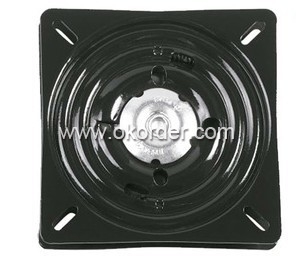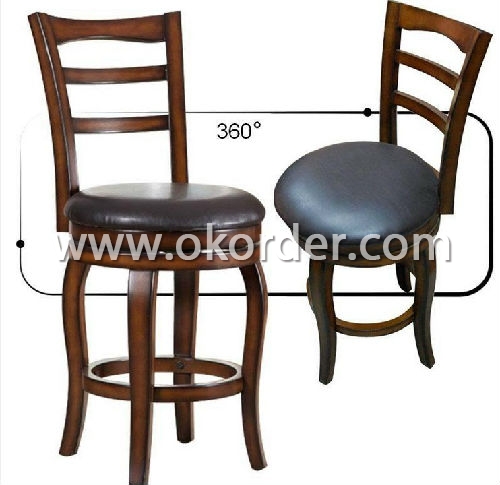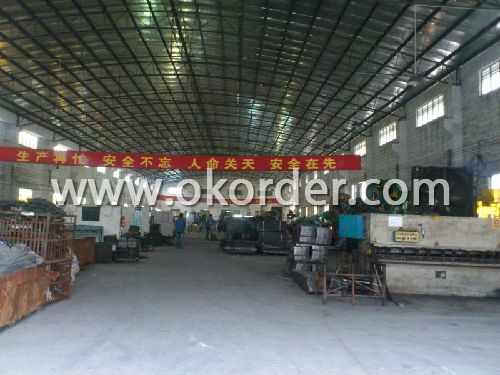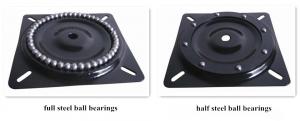Swivel Plate SV4801
- Loading Port:
- China Main port
- Payment Terms:
- TT or LC
- Min Order Qty:
- 1000pcs pc
- Supply Capability:
- 40000 Pieces Per Month pc/month
OKorder Service Pledge
OKorder Financial Service
You Might Also Like
Quick Details of Swivel Plate SV4801:
Type: Other Furniture Hardware Place of Origin: Guangdong, China (Mainland) swivel mechanism surface: powder coating
materials: steel origin place: China color: black size: 200*200*2.0mm structure: full bearings and half of bearings
Specifications of Swivel Plate SV4801:
swivel seat plate is made of the steel .And it is a half of bearings ,
1.swivel seat plates made of steel
2.that is 180degrees
3.The size is 200*200*2.0mm
4.structure :a half of bearings
5.surface :powder coating
6.color:black
Using:peisure chair ,bar chair ,bar stool .and other
Product Photos:



Packaging & Delivery:
Packaging Details: The size of the box is 21.5*20.5*2.3,Each box hold 20 pcs.And each box weight 27kg .
Delivery Detail: 30days
- Q:How does bearing steel contribute to the manufacturing of bearings?
- Bearing steel is a specific type of steel that offers high hardness, durability, and corrosion resistance, making it ideal for the manufacturing of bearings. The properties of bearing steel allow for the creation of strong and long-lasting bearing components that can withstand heavy loads, high temperatures, and intense rotational speeds. The steel's hardness helps to prevent wear and deformation, ensuring smooth and efficient bearing operation. Overall, bearing steel plays a crucial role in ensuring the reliability and performance of bearings in various industrial applications.
- Q:What are the cost implications of using special steel?
- The cost implications of using special steel can vary depending on factors such as the specific type of special steel required, its availability, and the market demand. Generally, special steel is more expensive than regular steel due to its unique composition and enhanced properties. Additionally, the production process for special steel may involve additional steps or specialized equipment, further increasing the cost. However, the higher cost of special steel can often be justified by its superior performance and durability, making it a worthwhile investment for applications that require specific characteristics or high-performance requirements.
- Q:What are the different joining methods used for special steel?
- The different joining methods used for special steel include welding, soldering, brazing, and mechanical fastening. Welding involves melting the base metal and adding a filler material to create a strong bond. Soldering and brazing use lower temperatures to join the steel using a filler material with a lower melting point. Mechanical fastening methods include bolts, nuts, screws, and rivets, which provide a secure connection without altering the base metal's properties.
- Q:What are the different methods of surface powder coating for special steel?
- Some different methods of surface powder coating for special steel include electrostatic spraying, fluidized bed coating, and flame spraying. Electrostatic spraying involves applying a charged powder to the steel surface, which is then cured in an oven. Fluidized bed coating involves dipping the steel into a bed of powder that is heated to a fluidized state, allowing the powder to adhere to the surface. Flame spraying uses a flame to melt and propel the powder onto the steel surface, creating a durable coating.
- Q:What are the different stamping grades of special steel?
- The different stamping grades of special steel include stainless steel, high-strength steel, tool steel, and alloy steel. Each grade has unique properties and characteristics that make them suitable for various stamping applications.
- Q:Can special steel be used in the mining equipment manufacturing industry?
- Yes, special steel can be used in the mining equipment manufacturing industry. Special steel, often known as alloy steel, offers improved strength, durability, and resistance to wear and corrosion compared to standard steel. These properties make it well-suited for the harsh and demanding conditions encountered in mining operations. Special steel can be utilized in various mining equipment components, such as drill bits, crushers, conveyor systems, and excavator buckets, to enhance their performance and prolong their lifespan.
- Q:What are the key alloying elements used in special steel?
- The specific application and desired properties determine the key alloying elements used in special steel. Some commonly used alloying elements in special steel are chromium, nickel, molybdenum, vanadium, tungsten, and cobalt. To enhance the steel's hardness, wear resistance, and corrosion resistance, chromium is often added. Nickel, on the other hand, increases the steel's strength, toughness, and corrosion resistance. Molybdenum is commonly used to improve the steel's high-temperature strength, resistance to creep, and resistance to corrosion by certain chemicals. Vanadium is added to increase the steel's strength, toughness, and wear resistance, especially at high temperatures. Tungsten is another element used to enhance the steel's high-temperature strength and wear resistance. Cobalt, on the other hand, is often added to improve the steel's strength and toughness, particularly at elevated temperatures. These alloying elements are carefully chosen and added in specific proportions to achieve the desired properties for various applications, including aerospace, automotive, energy, and tooling industries. By incorporating these alloying elements, special steel can be customized to meet specific performance requirements, making it suitable for a wide range of demanding applications.
- Q:Can special steel be used in corrosive environments?
- Yes, special steel can be used in corrosive environments. Special types of steel, such as stainless steel or corrosion-resistant alloys, are designed to withstand corrosion caused by exposure to moisture, chemicals, or other corrosive elements. These materials have a higher resistance to rust and corrosion, making them suitable for applications in corrosive environments like marine environments, chemical plants, or oil and gas facilities.
- Q:Is special steel suitable for medical equipment manufacturing?
- Yes, special steel is suitable for medical equipment manufacturing. Special steel possesses properties such as high strength, corrosion resistance, and biocompatibility, making it an ideal choice for producing medical devices and equipment. Its ability to withstand harsh sterilization processes and maintain structural integrity is crucial in the medical field, ensuring the safety and reliability of the equipment.
- Q:How does special steel contribute to the electrical conductivity of products?
- Several methods can be employed to utilize special steel in enhancing the electrical conductivity of products. Firstly, the formulation of special steel alloys can be tailored with specific chemical compositions that enhance its electrical conductivity. For instance, the addition of elements like copper, silver, or nickel to the steel creates additional pathways for the flow of electric current, thus increasing the conductivity. Moreover, manipulating the microstructure of special steel can also contribute to improved electrical conductivity. By controlling the size and orientation of the steel's grains, the resistance to the flow of electrons can be reduced, consequently enhancing the overall conductivity of the material. Furthermore, subjecting special steel to heat treatment or other processes can further enhance its electrical conductivity. Techniques such as annealing or tempering can effectively eliminate impurities and enhance the crystal structure of the steel, resulting in improved conductivity. In addition to these methods, special steel can also be designed with low magnetic permeability, reducing its resistance to the flow of magnetic fields. This characteristic proves advantageous in applications where minimizing electromagnetic interference is crucial, such as in electrical connectors or transformers. To summarize, special steel contributes to the electrical conductivity of products through various means, including its chemical composition, microstructural control, heat treatment, and low magnetic permeability. By optimizing these factors, special steel can significantly enhance the performance of electrical components and systems.
1. Manufacturer Overview |
|
|---|---|
| Location | Guangdong, China |
| Year Established | 1996 |
| Annual Output Value | US$ 5 to US$ 10 Million |
| Main Markets | 40.00% Domestic Market 10.00% Eastern Asia 10.00% Eastern Europe 8.00% Southeast Asia 8.00% South America 5.00% South Asia 5.00% Southern Europe 5.00% North America |
| Company Certifications | Test report for 3 section slide |
2. Manufacturer Certificates |
|
|---|---|
| a) Certification Name | |
| Range | |
| Reference | |
| Validity Period | |
3. Manufacturer Capability |
|
|---|---|
| a)Trade Capacity | |
| Nearest Port | Shunde, Huangpu, Shenzhen |
| Export Percentage | 61% - 70% |
| No.of Employees in Trade Department | 3-5 People |
| Language Spoken: | English, Chinese, Spanish, Japanese |
| b)Factory Information | |
| Factory Size: | 1,000-3,000 square meters |
| No. of Production Lines | 3 |
| Contract Manufacturing | OEM Service Offered Design Service Offered Buyer Label Offered |
| Product Price Range | Average |
Send your message to us
Swivel Plate SV4801
- Loading Port:
- China Main port
- Payment Terms:
- TT or LC
- Min Order Qty:
- 1000pcs pc
- Supply Capability:
- 40000 Pieces Per Month pc/month
OKorder Service Pledge
OKorder Financial Service
Similar products
New products
Hot products
Related keywords





























